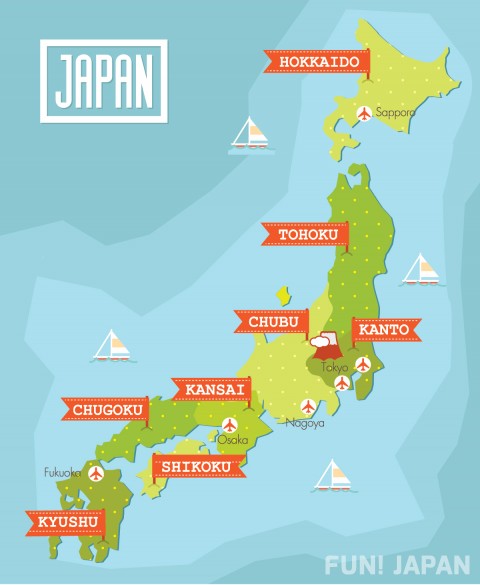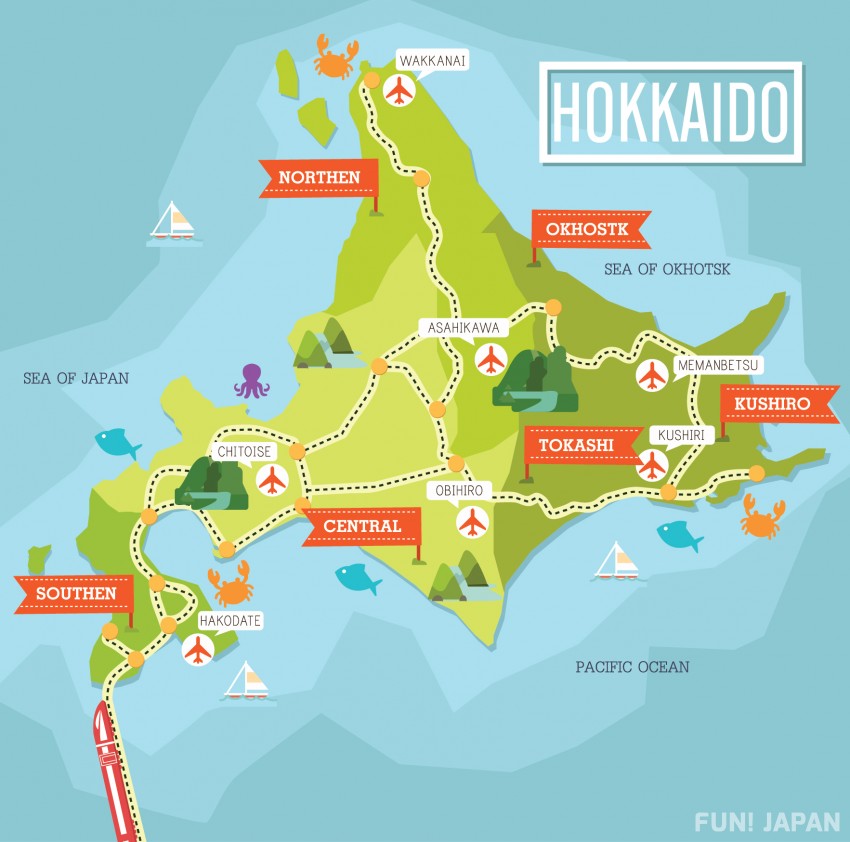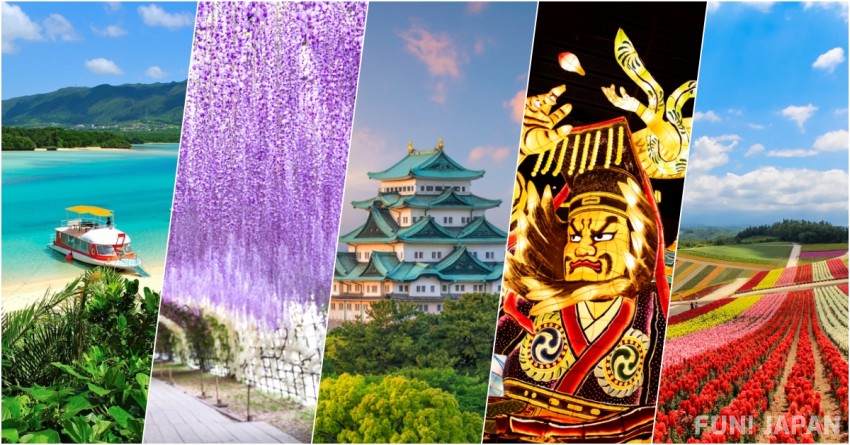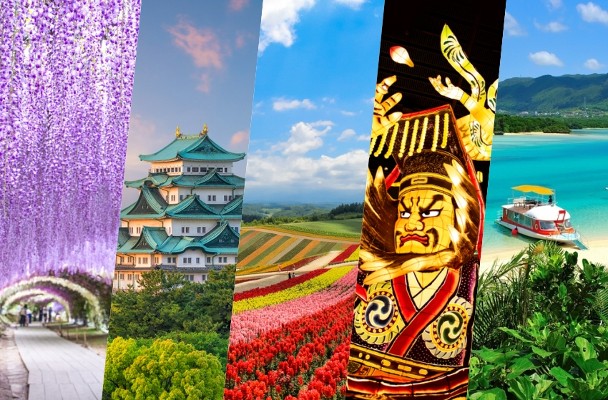Japan has 47 prefectures and each region has its own climate and culture. Different lands, of course, have different climates, customs and even languages.
In addition to the Kansai dialect, which is mainly used in the Kinki region such as Osaka and Kyoto, FUN! JAPAN has previously introduced that Kanagawa citizens add "jan" and "dabe" to the end of sentences, and that Ishikawa citizens call mushrooms Moss (コケ / koke). In this article, I will explain what "Japanese dialect" is and introduce useful greeting phrases for traveling in dialects, such as "Good Morning," "Excuse Me," and "Thank You."
How many "dialects" are there in Japan?

In contrast to the "standard language" (known as 標準語 / hyojun-go in Japanese) that is used in all prefectures of Japan, the words and accents that differ from region to region are called "dialects" (方言 / hogen).
Various studies have been conducted on the Japanese language. In the world of dialect research, the most-used reference is the work of Misao Tojo (東条操), a Japanese linguist in the Meiji period who published his "Hogen-kukaku-ron" (方言区画論 - the theory of the 'dialectal region') in 1953 based on grammar and vocabulary. According to Misao Tojo, the dialects of Japan can be broadly divided into two types: the "Mainland dialect" (本土方言 / Hondo Hogen), and the "Ryukyu dialect" (琉球方言 / Ryukyu Hogen - languages used in areas where the Ryukyu Kingdom once existed, such as the Okinawa Islands, the Sakishima Islands, and the Amami Archipelago in Kagoshima Prefecture).
Of the two dialects, the "Mainland dialect" can be roughly divided into 3 subtypes: "Eastern dialect" (東部方言 / Tobu Hogen), "Western dialect" (西部方言 / Seibu Hogen) and "Kyushu dialect" (九州方言 / Kyushu Hogen). These dialects can then be further classified into 16 different dialectal regions - such as "Hokkaido dialect", "Tohoku dialect", "Kanto dialect", "Tokai/Higashiyama dialect", "Kinki dialect", "Shikoku dialect" and etc, from Mainland dialect and Ryukyu dialect.

"○○-ben" (弁 - ○○ dialect) is a word used for certain dialect in each region and prefecture, which is more detailed division than the word "Hogen".
It is said that there are about 140 dialects throughout Japan. For example, there are the Hokkaido dialect (Hokkaido-ben, in Hokkaido Prefecture) and Tsugaru dialect (Tsugaru-ben, Aomori Prefecture) in the north, and the Kagoshima dialect (Kagoshima-ben, Kagoshima Prefecture) in the south. However, even within the same "Hokkaido dialect", the grammar and expressions differ depending on the areas for inland areas (Sapporo, Asahikawa, Obihiro, etc.) and the coastal areas (Hakodate, Muroran, Kushiro, etc.).
Among these dialects, Aomori Prefecture's "Tsugaru dialect" is said to be "the most difficult dialect in Japan," and even Japanese people can hardly understand it except for locals (because the pronunciation and accent are so similar to French, there was even a commercial for a major automobile manufacturer that appears to converse in fluent French in a car, but actually speaks in the Tsugaru dialect). In this way, it is not uncommon for people from other prefectures not to understand the dialect even though it is the same "Japanese language".

From here, I would like to give a lecture on dialect greeting phrases (dialect versions). In particular, we have picked up travel destinations that are very popular with FUN! JAPAN readers: Okinawa, Fukuoka, Aichi, Aomori, and Hokkaido - If you master them, you might be praised by the people you meet there saying, "Your Japanese is Perapera!"
* Only some expressions are picked up.
What are the Japanese dialects' phrases for 'Good morning' - "おはよう(ございます) / O-ha-yo-u (Go-za-i-ma-su)"?
* "おはようございます / O-ha-yo-u Go-za-i-ma-su" is a more polite expression than "おはよう / O-ha-yo-u".
- Hokkaido:
おはようございました / O-ha-yo-u Go-za-i-ma-shi-ta
In some areas of Hokkaido, it is considered polite to use the past tense form of "~でした / ~ de-shi-ta", and it is said to be a respectful expression to used when talking to superiors.
- Aomori:
おはよごす / O-ha-yo-go-su
- Aichi:
はやいなも / Ha-ya-i-na-mo
- Okinawa:
うきみそーちー / U-ki-mi-so-chi
It is a dialect used mainly in the main island (本島 / Honto) of Okinawa, and its direct translation means "Are you awake?" which is more appropriate to use as a greeting right after waking up. It would be more natural to use "はいさい / Ha-i-sa-i" (for men) or "はいたい / Ha-i-ta-i" (for women) when you go out and meet someone for the first time of that day (in the morning of course).
What are the Japanese dialects' phrases for 'Good afternoon / Hello' - "こんにちは / Ko-n-ni-chi-wa"?
- Aomori:
こんにずは / Ko-n-ni-zu-wa
- Okinawa:
ちゅーうがまびら / Chu-u-ga-ma-bi-ra
Or はいさい / Ha-i-sa-i (for men)・はいたい / Ha-i-ta-i (for women)
"はいさい / Ha-i-sa-i" and "はいたい / Ha-i-ta-i" are versatile greetings that can be used in the morning, during the daytime or even nighttime. When traveling to Okinawa, all you have to do is remember this phrase!
What are the Japanese dialects' phrases for 'Good evening' - "こんばんは / Ko-n-ba-n-wa"?
- Hokkaido & Aomori:
おばんです / O-ba-n-de-su
Or おばんでした / O-ba-n-de-shi-ta
"ばん / ba-n" corresponds to "晩" in kanji (ban - meaning 'evening'). It is often used by people in their 40s and 50s, and is sometimes used as a greeting in formal or public occasions.
- Aichi:
おしまいやす / O-shi-ma-i-ya-su
What are the Japanese dialects' phrases for 'Thank you' - "ありがとう(ございます) / A-ri-ga-to-u (Go-za-i-ma-su)"?
* "ありがとうございます / A-ri-ga-to-u Go-za-i-ma-su" is a more polite expression than "ありがとう / A-ri-ga-to-u".
- Aomori:
ありがどーごし / A-ri-ga-do-go-shi
Or ありがどごす / A-ri-ga-do-go-su
In addition to these, there is also a way of saying "めやぐだ / Me-ya-gu-da" to express gratitude when you make someone take time to help you or when you trouble someone for help or assistance. The pronunciation is very close to "迷惑だ / Me-i-wa-ku-da" (meaning 'troublesome' or 'annoyance') in standard language, so people outside the prefecture might misunderstand it as a complain instead of the word of gratitude.
- Okinawa:
にふぇーでーびる / Ni-fe-de-bi-ru
Although it is a dialect commonly used on the main island (Honto) of Okinawa, it is expressed differently based on remote islands, such as "たんでぃがーたんでぃ / Ta-n-di-ga-ta-n-di'' on Miyako Island and "みーふぁいゆー / Mi-Fa-i-yu" on Ishigaki Island.
What are the Japanese dialects' phrases for 'Yummy / Tasty' - "おいしい / O-i-shi-i"?
- Hokkaido:
(No particular expression)
By adding "なまら / Na-ma-ra" before "おいしい / O-i-shi-i" or "うまい / U-ma-i", which mean "Tasty" in common Japanese, the phrase becomes "Very tasty" in Hokkaido dialect. Try using it after eating your seafood bowl (kaisendon)!
- Aomori:
んめぇ / N-mee
- Aichi:
うみゃあ / U-mya-a
There are also variations such as "うめゃぁがやぁ / U-mya-ga-ya" and "うみぁーっ / U-mi-a".
- Fukuoka:
うまかー / U-ma-ka
By the way, in Japan, there is a tonkotsu-flavored packaged noodles called “Umakacchan” (うまかっちゃん), which is sold in supermarkets all over the country. The product name actually comes from the Hakata dialect, which means “it’s delicious”.
- Okinawa:
まーさん / Ma-sa-n
When you want to emphasize "very delicious", add "いっぺー / I-ppe" which means "very" to the front and say "いっぺーまーさん / I-ppe-ma-san".
What are the Japanese dialects' phrases for 'See you / Bye bye' - "また / Ma-ta", "さようなら / Sa-yo-u-na-ra"?
- Hokkaido:
したっけ / Shi-ta-kke
One of the dialects representing Hokkaido. In addition to the meaning of "see you" when parting, it is also used as a conjunction like "そうしたら / So-u-shi-ta-ra" (meaning 'in that case' or 'well then').
- Aomori:
へば / He-ba
An expression in Akita dialect, Tsugaru dialect, and Shimokita dialect, which are widely used in the Tohoku region (mainly Aomori and Akita).
- Aichi:
ほんなら / Ho-n-na-ra
A dialect word widely used mainly in the Kansai and Chubu regions. It is also used in Kagoshima.
- Okinawa:
ぐぶりーさびら / Gu-bu-ri-sa-bi-ra
「さようなら」「また会いましょう」の意味が込められているほか、「Excuse me」に相当する「失礼します」としても使われる。
In addition to the meaning of "さようなら / sa-yo-u-na-ra" (goodbye) and "また会いましょう / ma-ta-a-i-ma-sho-u" (see you again), it is also used as "失礼します / shi-tsu-re-i-shi-ma-su", which is equivalent to "excuse me" (used when leaving early or in the middle of something).

Comments